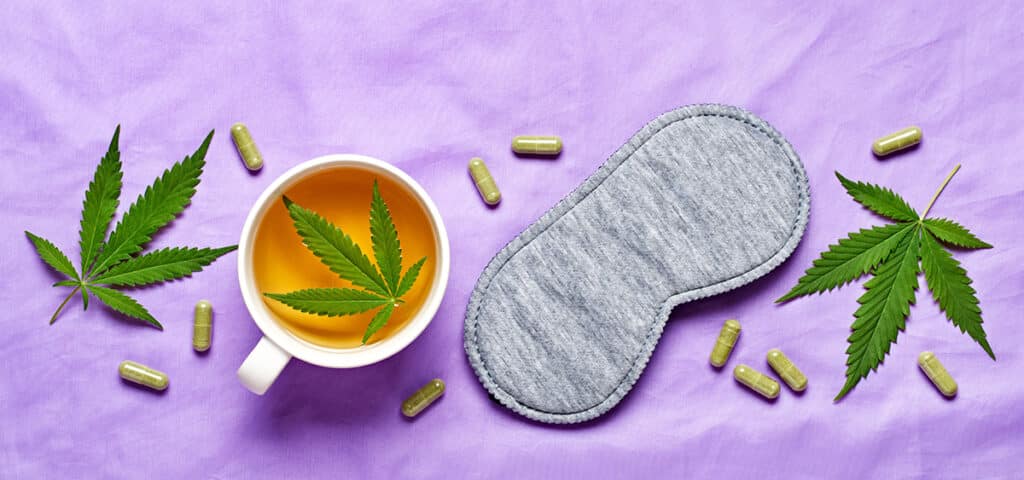A recent study found that about 80% of people who consume cannabis to help with sleep quit using prescription and over-the-counter sleep aids such as melatonin and benzodiazepines.
Study: People Who Consume Cannabis for Sleep Quit Sleep Aids

Healthy night sleep concept. Sleep mask, calming hemp tea and hemp capsules on silk lilac background.
Full story continued below.
Advertisement
A study by Washington State University (WSU) researchers found people who consume cannabis to help with sleep quit using prescription and over-the-counter sleep aids such as melatonin and benzodiazepines. The study, published in the Exploration of Medicine journal, found 80% of the 1,255 cannabis consumers surveyed, no longer used the sleep aids, relying instead on high-THC cannabis products.
Half of those surveyed reported specifically using cannabis containing CBD and the terpene myrcene, 33.8% used cannabis edibles, and 14.1% used cannabis capsules.
In a statement, Carrie Cuttler, senior author of the study and associate professor of psychology at WSU, said that people were seeking out cannabis products with myrcene in them to help with sleep “surprised” her.
“There is some evidence in the scientific literature to support that myrcene may help to promote sleep, so cannabis users seemed to have figured that out on their own.” — Cuttler in a press release
Study participants reported varying morning outcomes and side effects – cannabis users more commonly reported feeling refreshed, focused, and better able to function in the morning after consuming cannabis, and said they experienced fewer headaches and less nausea compared to using traditional sleep aids. Cannabis consumers also reported feeling sleepier, and more anxious and irritable in the morning after consuming cannabis compared to other sleep aids and were also more likely to report experiencing dry mouth and red eyes after consuming cannabis.
“In general, the use of cannabis for sleep-related issues was perceived as more advantageous than over the counter medications or prescription sleep aids,” Cuttler said. “Unlike long-acting sedatives and alcohol, cannabis was not associated with a ‘hangover’ effect, although individuals reported some lingering effects such as sleepiness and changes in mood.”
More than 60% of study participants said they got six to eight hours of sleep when using cannabis alone, while less than 20% of participants said they got six to eight hours of sleep when using a sleep aid.
The study, “A large-scale survey of cannabis use for sleep: preferred products and perceived effects in comparison to over-the-counter and prescription sleep aids,” was published October 25 and appeared in the journal’s special issue titled Beyond Weed: Clinical Applications of Cannabis and Cannabinoids.
Get daily news insights in your inbox. Subscribe
End